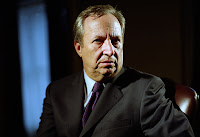HOBSON: You recently called for a new stimulus in the form of a payroll tax cut. But it's been reported over and over again that within the Obama administration -- when you were in the administration -- you were actually on the side of a smaller stimulus back in 2009.
SUMMERS: Not accurately. Not accurately.
HOBSON: That's not true? You weren't pushing for a less-than $1.2 trillion stimulus?
SUMMERS: No, I mean it's a much more complicated story, but those reports are not accurate. It was my judgment as an economist that there was no danger of doing too much stimulus and one should achieve as much stimulus as possible. There were a set of political calculations having to do with what the Congress could accept that were mostly determined by the president's political advisers and ultimately by the president which pointed towards the size of the program that was ultimately passed. But the economic advice that I gave was that the stimulus program should be as large as it could be.
HOBSON: Do you think it was too small in the end?
SUMMERS: I think it in the end we would've been better served if there had been more push to the economy. We would've been better served if the measures that the president put forward in the fall of 2009 for expanded infrastructure investment, for expanded support for state and local governments that passed through the House had also passed the Senate. But the choices that were made were made in a given political context and I think given the slender margins of one vote by which the Recovery Act was passed I suspect an effort to push it to a higher level might well have backfired and resulted in legislation not passing. And at that moment that would've have catastrophic consequences in terms of depression.
HOBSON: Well politics aside, do you think there's anything that the administration should've done differently in the midst of the financial crisis or the depths of the recession?
SUMMERS: I don't know what you mean by politics aside. Administrations exist in a political context. I've already indicated that I think that the imperative was to push the economy forward. I think the administration was successful in achieving as large a fiscal program at was possible in the political environment they faced. That it would've been desirable if it was still larger fiscal program could've been passed.
HOBSON: How would you describe President Obama's economic philosophy?
SUMMERS: I think he's a deeply pragmatic economic thinker. He recognizes that the key to any society is the success of its middle class. He's focused on improving opportunities for the middle class. He wants to look at experience around the world and see what works best and pursue that.
He's neither an ideologue who believes in untrammeled free markets nor an ideologue who believes that everything is best done by government. But I would describe his economic philosophy as supremely pragmatic. And I think it was a successful philosophy.
There was a very real chance of depression in the winter of 2009. And that was avoided. It didn't have to be avoided, but much like the nuclear, the Cuban Missile Crisis where it's not that anything great happened in October of 1962, but disaster was avoided. In the same way the policy package that the president put forward was successful in preventing the Great Recession from becoming a second Great Depression.
HOBSON: Once we get past this debt ceiling debate, what would you advise the president is the next most important economic thing to focus on?
SUMMERS: Oh I think it's got to be job creation and demand and that goes back to tax policy, that goes back to infrastructure. That goes back to promoting exports. That goes back to assuring financial adequacy for state and local governments...
Via Brad DeLong


No comments:
Post a Comment